- Home
- Beryl Kingston
Citizen Armies Page 2
Citizen Armies Read online
Page 2
‘What a lark,’ he said. ‘Our Johnnie getting hisself married at last! He’s a-blushing all the time these days. Ent yer Johnnie?’
Rosie blew her brother a kiss. ‘Better late than never Johnnie, you daft ha’porth!’ she said.
Johnnie pulled Connie towards him, blushing scarlet. But then he didn’t know what to say and had to examine his boots for a considerable time.
Rosie looked at Connie’s squat figure, her round face, her discoloured teeth and her funny little snub nose, and watched as she smiled at Johnnie and patted his arm. She might not be a beauty, Rosie thought, but she’s very fond of our Johnnie and always has been. They’ll make a good match.
‘I think it’s lovely you’re going to marry our Johnnie,’ she said. ‘And you must take good care of her, Johnnie.’ At which he grinned but blushed all over again.
He was rescued by Tess, who’d gone into the kitchen and now emerged carrying the roast pork on its familiar dish, and set it down on the table in front of Pa, ready to be carved. Rosie was touched to see how tenderly Johnnie took over the carving when he could sense their Pa was tiring. Poor old Pa, she thought, watching him.
When all their plates had been piled high, the conversation turned at last to what the newly-engaged pair would like as a wedding present and when the wedding was likely to be.
‘November,’ Johnnie told them, ‘when the harvest’s in. That’s about the soonest we can do it, ent it Con?’
‘We don’t think he’s likely to be called up,’ Connie said, ‘at least not yet awhile, on account of he works on the land, and they’re supposed to be reserved or whatever it is, but you never can tell these days, can you? They ent said nothin’ yet.’
Rosie agreed that they couldn’t, but all this talk was making her remember those stupid Eden boys and how passionately they’d wanted to join the first war. They’d called it a ‘good show’ and said they didn’t want to miss it, as if it was some sort of game. We should’ve learnt the hard way, she thought, given what we all went through. We certainly shouldn’t be starting another war.
‘I hope he is reserved,’ she said to Connie. ‘Don’t let him go rushing into anything, that’s my advice. We don’t want him ending up like our Tommy.’
‘And our Charlie,’ Connie said sadly, looking at her mother. ‘They was killed the same day.’
Wrong topic, Rosie thought, and pulled them back to considering their wedding.
‘Will you get married in St Mary’s?’ she said.
‘Course!’ Connie said, cheering up. ‘And I’m gonna have young Anna here as one of my bridesmaids. And afterwards we’re coming back here to live, so’s we can all look after Pa. We couldn’t leave Pa on his own, could we Johnnie? And I can give Kitty a hand with things, can’t I Kitty?’
Kitty looked across at Rosie and made a grimace, so it obviously wasn’t going to be entirely to her liking. But Connie was waiting to be praised, so Rosie made an answering grimace at Kitty and then approved.
‘Lovely,’ she said.
‘And you’ll all come?’ Connie said. ‘Won’t you?’
Rosie leant across the table and kissed her. ‘We wouldn’t miss it for all the tea in China,’ she said. ‘I promise.’
But she was thinking: no matter what happens.
Chapter Two
Gracie and Rosie got up early that Sunday morning and cooked a good breakfast to set themselves up for the day. Then they kissed Jim goodbye, slung their gas masks obediently over their shoulders because he insisted on it, picked up the two bags they’d packed for Mary the night before, and set off for London Bridge and their trip to Hastings.
It turned out to be a rather uncomfortable journey, because they talked about the coming war all the way. Rosie would have preferred to chat about Johnnie’s wedding, but Gracie was full of information about the injuries she was being trained to deal with and she wanted to tell her mother every ghastly detail. It was obvious to both of them that the authorities expected London to be bombed – like Prague and Guernica, and with the same terrible results.
‘They’ve got thousands of cardboard coffins waiting in the warehouses, all made and ready,’ Gracie said. ‘Thousands. Isn’t that gruesome? And a special train to take them out of London because there won’t be room to bury them where they’re killed. Imagine that.’
Rosie found it hard even to accept it, but there’d been millions of deaths in the Great War, so it was horribly possible.
‘Yesterday they taught us how to protect people with crushed limbs and amputations from the weight of the bed clothes,’ Gracie said, her young face serious beneath her mop of dark hair. ‘We’ve got special cradles for it. And on Monday we’re going to learn how to deal with shock, because Sister says that’s the most important thing with casualties, and we’ve got a lecture on how to cope with injured children. And we’re not going to get home much now the war’s started. They warned us about that, too.’
Rosie gazed out at the peaceful fields smoothing past their window and listened with anguished pity. It seemed appalling to be talking about casualties and injuries and to be travelling to an evacuation zone on such a lovely, sunny day. And, when they got off the train and smelled the sea and heard seagulls screaming over their heads as if life was completely normal, she felt so confused that she just stood where she was, until she could gather her senses. Then she became aware that Mary was rushing towards them from the other side of the road, waving and calling as if they’d been apart for months instead of a week.
‘Hello Mum,’ she called. ‘Hello Gracie. How’s Guy’s?’ And when she’d reached them and was hugging them, ‘Did you bring my sandals? My feet are killing me. I never knew school shoes could be so ghastly hot. Me and Maggie have been walking about barefoot. She said I was clomping about like an elephant.’
‘Elephants don’t clomp,’ Gracie said, looking superior.
‘That’s all you know, clever clogs,’ Mary said. ‘They do too.’
Why must they do this? Rosie thought, watching them as they squared up to one another. It’s so childish and they’re grown women now, not kids. They should have grown out of it years ago.
‘Elephants glide,’ Gracie insisted, ‘and roll from side to side. Like ships at sea.’
‘I’ve never seen an elephant gliding anywhere,’ Mary said, glaring. ‘So there!’
‘Well then you’ve forgotten the zoo,’ Gracie said. ‘I’d have thought–’
Rosie moved in on their tiff before it could get out of hand, as it too often did. ‘Are we going to stand about on the pavement all day talking about elephants?’ she said. ‘I thought we’d come down to see your lodgings.’
Mary changed on the instant and was her smiling self again. ‘And so you have,’ she said, turning to hug her mother. ‘Oh it is good to see you.’ And she gave Gracie a grin, adding, ‘Both of you.’ And got an answering grin back – to her mother’s relief. Then she took Rosie’s bag and set off down Station Road at a very brisk pace. ‘Come on,’ she said. ‘I’ve got such a lot to tell you.’
She talked all the way, the words bubbling from her in a never-ending flow. ‘We’re billeted in the high school,’ she said, as she rushed them down Station Road. ‘It’s not as big as St Olave’s but it’s not bad, all in all. We share the building turn and turn about. We use it in the mornings and they have the afternoons for one week and then it’s vice versa the next week. We’ve got the most complicated timetable you ever saw. The high school kids don’t seem too keen on us, as far as I can see. I mean, the teachers are all right about it but some of the juniors give us looks. Anyway it suits us fine. It means we get half the day off to explore. Only trouble is it’s not going to last very long, according to old Jonesey. She says not to bank on it. Apparently they’re going to rent a hall or some such where we can have our dinner and classes and they’re looking for a large empty house somewhere too, so she says, so we can have form rooms and classrooms there. That could be quite fun. One good thing, they don’t make
such a fuss about uniform down here. Although they might start putting the pressure on again when we’ve got all our clothes here.’ They’d reached a small square where there was a large Woolworths – shut for Sunday of course – and several shops. ‘Now this is where we meet up when we’re not at school.’
It was an unnecessary explanation, because the square was full of girls in St Olave’s uniform wandering about and chattering like a flock of starlings. Several of them had bicycles and stood leaning on the handle bars to talk to their friends. Many of them turned to wave at Mary as soon as she set foot in the place, so she had to stop and talk to them. And after a while, a few of the older girls came over to say hello to Gracie and ask how she was getting on at Guy’s.
Rosie stood in the easy sunshine and watched them, feeling proud to think that her daughters were so popular and got on so well with their friends. But eventually Mary said she’d have to go or they’d be late for dinner and then they’d cop it, so they set off on their trek again and she resumed her commentary.
‘That’s West Hill over there,’ she said, waving her hand at it. ‘The old town is on the other side of it. I’ll show you round when we’ve had our dinner. It’s ever so old. You’ll love it. Now we’re going uphill. It’s all hills round here. Old Mother Maudie says climbing’ll keep us healthy.’
Old Mother Maudie’s an idiot, Rosie thought, as they climbed through the narrow streets. ‘I shall be glad to get there,’ she said.
Mary grinned at her. ‘We all said that the first day,’ she said. ‘But we’re used to it now. Soon be there. This is Plynlimmon Road we’re in now and Gladstone Terrace is just round the bend at the top.’
Which, after a brief halt to catch their breath, it was.
They stopped in front of a sturdy Victorian house in the middle of the terrace. It was two storeys high under a slate roof, like all the others, and had a short flight of well-scrubbed stone steps to the front door, bay windows on both floors, with lace half curtains – as Rosie was quick to notice – and a gleaming door knocker smelling of Brasso. In every respect a well-kept, proper house – at least from the outside.
Mary had taken a key from her blazer pocket and was fitting it into the lock. ‘It made me think of London the minute I saw it,’ she said, looking back at her mother. ‘I mean, there’re lots and lots of houses just like this in London.’
She wants me to agree with her, Rosie thought, reading her daughter’s anxious expression. ‘Yes,’ she said. ‘It is like a London house. I’ll bet you feel quite at home here.’ Actually, the old houses and hilly streets had been reminding her of Arundel, not London, but that was something she would keep to herself.
‘I do,’ Mary said, and she led them cheerfully into the house, calling, ‘I’m back, Mrs M,’ as she went.
It was dark in the hall after the dazzle of sunshine outside and it took a little while for Rosie’s eyes to adjust. But all her other senses were fully alert, noting that this was indeed a clean, well-kept house, that it smelled of polish and soapsuds and cooking, fresh bread, pastry, a roast of some kind, something spicy – cloves, was it? Then the door to the kitchen opened and two people came out, one after the other. The first was a short, stout rosy woman in a flowery apron, who waddled towards them, smiling and holding out a hand in greeting. The second was a tall, skinny man who stooped behind her, looking anxious. He seemed to have been dunked in a flour bin. His hair was quite white with it, and so were his bushy eyebrows and his beard, and his shirt and trousers were as much grey powder as cloth.
‘Hello,’ the rosy woman said, shaking Rosie’s hand. ‘You must be Mrs Jackson. And you must be Gracie. I’ve heard so much about you I almost feel I know you – though p’rhaps that’s a silly thing to say. P’rhaps I shouldn’t say it. You never know, do you? Anyway, your Mary’s such a good girl and we talk about anything an’ everything, and you learn a lot talking, don’t you? Come through into the parlour and I’ll show you where she and Margaret do their homework. Father’ll keep an eye on the dinner, won’t you Father?’
The lanky man gave them a shy smile and retreated to the kitchen, and Mrs Ferguson led the rest of them into her front room, talking all the way. ‘Of course, this was the breakfast room when we ran the B and B. Me and Father eat in the kitchen, it being more convenient, like. I mean to say we always have. We thought it would be just the place for the girls to do their homework, not the kitchen I mean, no, course not, this nice front room. Nice and quiet, like, and lots of room for their books an’ all.’
‘Yes,’ Rosie said, taking it all in, from the aspidistra in the window in its dark green Victorian pot, past the pairs of fading seaside prints on the walls, to the heavy oak dresser with an old fashioned condiment set at one end of its well-polished top and a bottle of Parker’s ink standing, rather incongruously, on a neat tray at the other. There were school books piled on the table and open in front of two of the chairs, so she gave Mary a nod of approval, thinking what a good girl she was. She was obviously getting on with her work, despite all the disruption.
Mrs Ferguson was still chattering on. ‘I mean to say, paying guests ent the same, are they? Not that I got nothing to say against ʼem. I mean to say they was our bread an’ butter for a good long time, paying guests was, an’ most of ʼem was very nice. It’s just they’re not the same. Don’t you think so Mrs Jackson?’
Rosie had been paying so little attention to her, she didn’t know what to say. But luckily she was saved by the arrival of Mary’s friend Margaret, who came rushing into the room bringing a waft of sea air with her and saying she hoped she wasn’t late for dinner.
‘No, no, dearie,’ Mrs Ferguson reassured her, beaming. ‘You’re in plenty of time. I’ve just got to put the finishing touches to it an’ then I shall start dishing up.’ Then she turned to Mary. ‘Why don’t you show your mum your bedroom?’ she said. ‘You’ll just about have time.’
‘Good idea,’ Mary said. ‘Then I can get out of these ghastly shoes.’
They trooped up the stairs one behind the other, Mary and Gracie carrying the bags and Margaret bringing up the rear. ‘She does run on,’ Mary said, when they were on the landing and out of earshot of their host. ‘Don’t get me wrong, she’s really kind and everything… but she will talk. Here you are! This is it.’ And she walked into the room, opened the bag she’d been carrying and emptied it all over the nearest bed. ‘Now, where’re my plimsolls?’ she said, rummaging in the pile. ‘Oh God! I can’t find them. Did you pack them?’
‘We did, and they’re in my bag,’ Gracie told her severely. ‘As you could’ve found out, if you’d asked instead of throwing everything all over the place.’ And she started to unpack her bag, tantalisingly slowly and methodically.
Here we go again, Rosie thought, and stepped in quickly to find the plimsolls and hand them over to Miss Impatience before her two girls could get into another spat. Mary put them on at once and sighed with dramatic relief.
‘Thank God for that,’ she said. ‘Another five minutes in those ghastly shoes and my feet would have burst into flames.’
‘Where do you put your clothes?’ Gracie asked.
Margaret was lying on her own bed as if she was exhausted, but she waved a languid hand at two tallboys. ‘Hers is the one on the left,’ she said.
‘Come on,’ Rosie said to Mary. ‘We’ll unpack together. Many hands make light work and you’ll be able to help us, won’t you? Now your feet aren’t on fire.’
Mary grimaced but set to work re-folding the clothes she’d tossed about and handing the now neat piles to Gracie, who put them away. The job was almost finished when they heard Mr Ferguson calling to them from the hall: ‘Grub up, gels!’ and Margaret sat up, then stood up and straightened her skirt and blouse.
‘That’s it,’ she said. ‘That’s the call that has to be obeyed instanta. Capital sin to keep the food waiting. She likes to serve it piping hot.’
By now, what with the endless chatter and the insistence on being on time fo
r meals, Rosie was having serious misgivings about her daughter’s landlady. But she had to admit that the meal was very well cooked – the roast lamb done to a turn, the roast potatoes crisp outside and fluffy within, the mint sauce fresh and vinegary and a very tasty dish of cabbage, fried onions and diced bacon. She couldn’t have done better herself, and said so.
‘They learned us well up the big house,’ Mrs Ferguson told her. ‘That’s one thing I will say for ʼem. It’s not much fun being in service, to tell you the truth, specially when you’re just a young un, but they did learn us well.’
She was another one like me, Rosie thought. ‘Very true,’ she said. ‘How old were you when you started work? If I may ask.’
Mrs Ferguson looked shamefaced. ‘Day after me twelfth birthday,’ she admitted. ‘That was what they done to us in them days.’
They had found common ground. ‘I know,’ Rosie said, ‘they did it to me too,’ and beamed at her.
Mrs Ferguson was so surprised her mouth fell open. ‘Was you sent to a big house an’ all?’ she asked.
‘Very big,’ Rosie told her. ‘It was Arundel Castle. I was a nursemaid there.’
‘Lawks a mercy, I don’t envy you that, an’ that’s the truth,’ Mrs Ferguson said. ‘Terrible job that is. I wouldn’t ha’ wanted to do it for all the tea in China. All them dirty nappies an’ all. Not that they never asked us our opinion.’
Mary had been following the conversation with great interest. ‘Well I never,’ she said to her mother. ‘I thought you only worked in the films.’
Rosie grinned. ‘You don’t know the half of what I got up to when I was young,’ she said.
Her hosts were very impressed. Mr Ferguson’s eyebrows had risen into his floury hair. ‘My stars!’ he said. ‘We got a fillum star at our table, Maud. Imagine that!’
‘Not quite, Mr Ferguson,’ Rosie said. ‘I was only a bit part player. And only from time to time.’
‘Even so,’ Mr Ferguson said, admiring her, ‘to be in the fillums. I mean for to say, that’s…’ But then he couldn’t find the words he needed and had to stop.

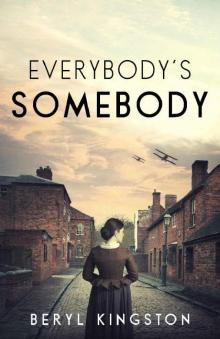 Everybody's Somebody
Everybody's Somebody Sixpenny Stalls
Sixpenny Stalls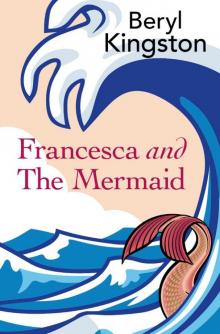 Francesca and the Mermaid
Francesca and the Mermaid Avalanche of Daisies
Avalanche of Daisies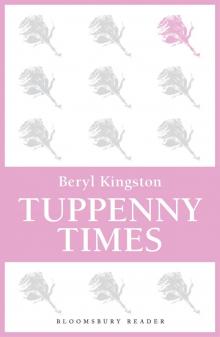 Tuppenny Times
Tuppenny Times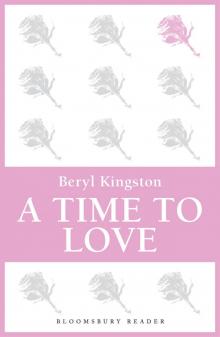 A Time to Love
A Time to Love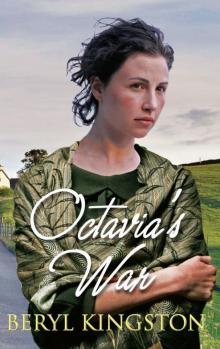 Octavia's War
Octavia's War Gemma's Journey
Gemma's Journey London Pride
London Pride Gates of Paradise
Gates of Paradise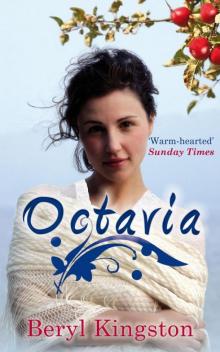 Octavia
Octavia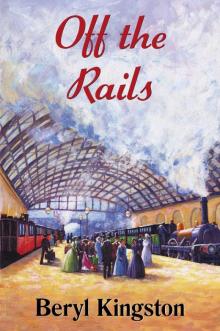 Off the Rails
Off the Rails Maggie's Boy
Maggie's Boy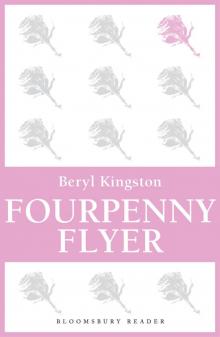 Fourpenny Flyer
Fourpenny Flyer